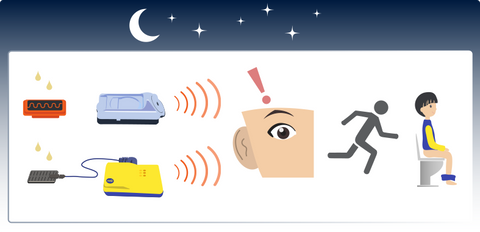
What are the odds of growing out of bedwetting?
Share
Parents’ concerns about bedwetting are often dismissed
It is very common for concerns about a child’s bed wetting to be dismissed out of hand by well-intentioned family and friends. The advice is often that they will just “grow out” of it.
My doctor told me not to worry.
Medical professionals often reassure parents that everything is normal and not to worry – however, is this treating the parent rather than treating the child?
Some GP’s and nurses may not be trained in modern best practice when it comes to bedwetting, and it isn’t high on their list of priorities because it is a relatively benign childhood condition; no-one dies from it! Also, because pharmacological remedies are short-lived and can have rare but serious side-effects, there is an understandable reluctance to prescribe these. As a result, there are not a lot of tools in your doctor’s bag to deal with bedwetting and referrals to overstretched hospital Paediatric Departments or underfunded Enuresis Clinics are simply not in their interests.
What does ‘growing out’ of bed wetting actually mean?
Growing out of bedwetting means that a child develops the ability to recognise a full bladder during sleep. They will start getting up to use the toilet, or hold on until morning. It’s like catching a ball – some kids do it automatically – some need a bit of practice.

When will my child ‘grow out’ of bed wetting?
Even if you, a friend or family member’s child was a bedwetter and grew out of it at a certain age, this is no guarantee your child will also stop bedwetting at the same age.
The real odds of your child growing out of bed wetting
A lot of well-meaning friends and family doctors haven’t done the math before they tell you not to worry.
Most children are night toilet -trained by the age of 4. If a child is still wetting the bed when he or she commences school, around 5 years of age, the statistics show that only 15%of them will stop unaided every year from this age on.
This means that by the age of 9, over half of all those children who wet the bed at 5, will still be wetting the bed! These are not great odds, especially after 4 years of putting up with the costs of extra laundry and disposable diapers, but more importantly, the costs to a child’s self-esteem.

Once a child is in double figures, bedwetting is often causing havoc with their confidence and emotional development. By the age of twelve, 1 in 3 bedwetters are still wetting the bed and by 16, 1 in 6 bedwetters still haven’t outgrown it. ☹☹☹ Imagine how you would feel if you were a teenager who wet the bed.
Bedwetting is not a life-threatening condition BUT you still need to do something about it unless there is a good reason not to e.g. underlying health issues, family problems, parental stress.

Should I keep my child in diapers and “manage their bedwetting”
In order for your child to learn, he or she needs to experience the unpleasant consequences (smell, sensation, and discomfort) of wetting in their sleep, but fully absorbing diapers take this away.
The annual cost to the household budget of keeping your child in disposable diapers is significant. If you can afford diapers, you can afford a bedwetting alarm and eliminate this expenditure! Also, diapers impose a huge cost to the environment where they are the 3rd largest product in landfills behind newspapers and beverage containers.
“children achieve ‘dryness’ independently more quickly when they discontinue wearing disposable containment products. Therefore, long-term use of disposable products is generally not recommended by continence consultants.” – Australia Continence
I was told my child doesn’t produce enough anti-diuretic hormone (ADH)
It is true that some children don’t produce enough ADH hormone to stop the kidneys from producing urine at night. However, lack of ADH does not cause bedwetting. Children who have low levels of ADH but have developed their bladder reflex won’t wet the bed – they will just get up and go to the toilet.
My child is a very deep sleeper -that’s why she wets the bed
Again, there are many children who sleep deeply who do not wet the bed. Deep Sleepers who do not respond to the full-bladder signals during sleep need to develop their ability to do this.
How does a bedwetting alarm stop my child from wetting the bed
A bedwetting alarm trains the child’s brain to recognize the signals from the bladder so they can wake up and go to the toilet before they wet. It does this by putting a sensor in the underwear which triggers the alarm when the child first starts to wet and the alarm wakes them so they can go to the toilet.
Over time the brain works backwards and figures out the reason it is being woken by the alarm is due to the feeling of a full bladder. Eventually, the child will respond to this feeling before the alarm goes off. This is called Conditioned Learning.

Bedwetting alarms are the only method proven to treat bedwetting successfully.
So, if your child is still a bedwetter when he or she starts school you may want to consider using an alarm to help them with their night toilet training. With a little effort, they will be able to enjoy the freedom of a dry night’s sleep like the majority of their classmates.
"My son is now dry after years of significant bedwetting. Thank you so much for your help. You’ve helped a little boy gain confidence again." - Sarah, Australia
